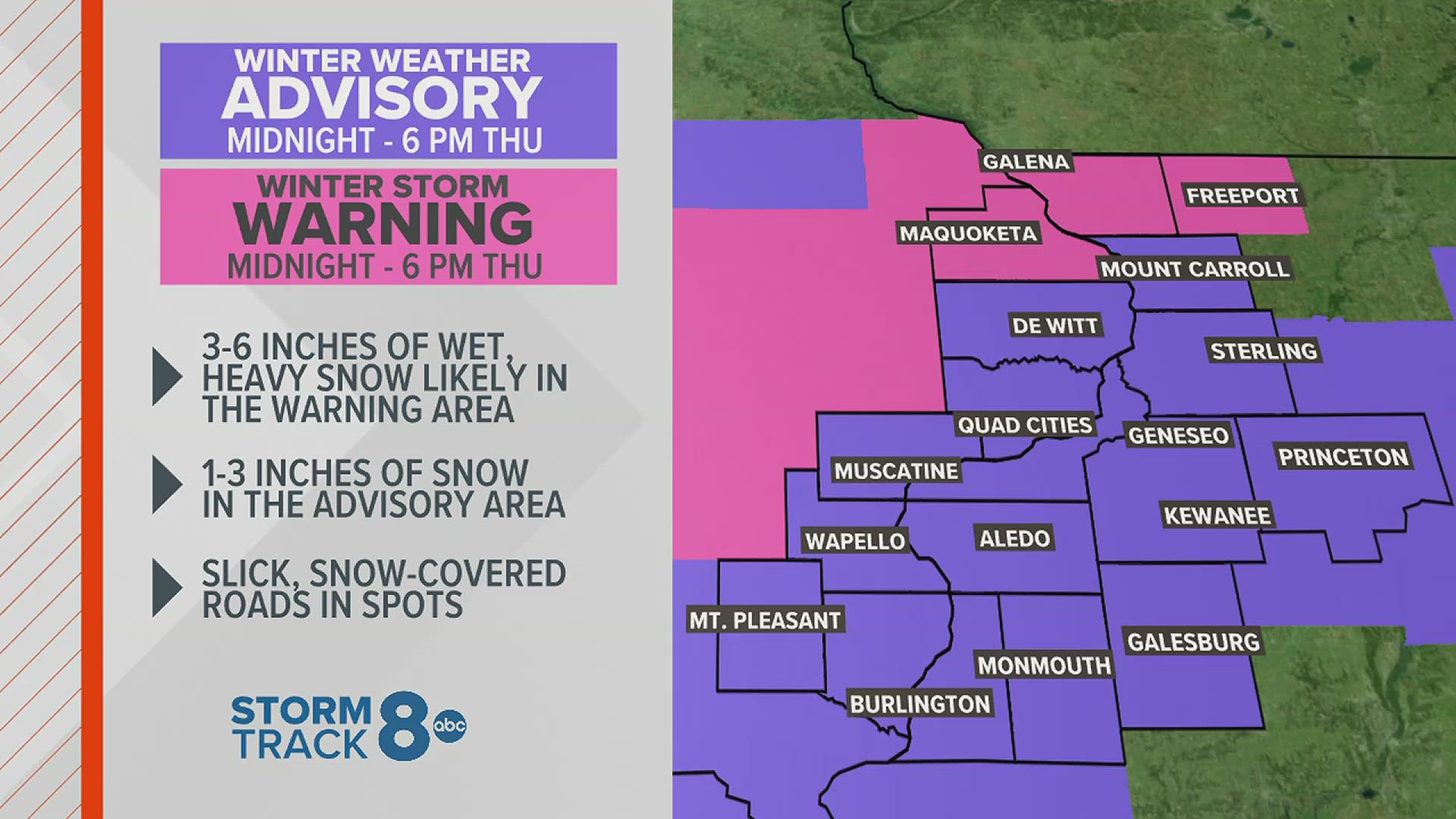MOLINE, Ill. — Editor's note: The above video was recorded Wednesday afternoon. Updated forecast information can be found by clicking/tapping here.
Another winter storm is expected to strike the Quad City area and the further Midwest region starting in the early hours of Thursday, Feb. 16.
A Winter Storm Warning has been issued for areas northwest of the Quad Cities starting at midnight on Thursday and ending at 6 p.m. StormTrack8 says accumulating snow for all hometowns in the area will start early Thursday morning.
As with any storm, it's important to make sure you're prepared for anything and everything. Below is a list of things to keep in mind while you're preparing.
Carbon Monoxide poisoning
As you're stuck inside with the heating system going, carbon monoxide can be a potential danger if some of your household equipment is compromised.
Carbon monoxide is an odorless, colorless gas that can quietly fill a home and poison its occupants, especially when buildings are sealed shut during extremely cold temperatures.
This is the reason that carbon monoxide detectors are required in homes, and the devices should be placed outside bedrooms.
Even if windows and doors are left open, the gas can still fill up a home to fatal levels.
Authorities said that if a detector activates, it's safer to assume a real emergency than to assume that the battery is going out.
If you call 911 to report a carbon monoxide detection, the dispatcher will ask if anyone in the residence has certain symptoms, like headaches or signs of flu, that only appear while at home. if symptoms are found, dispatchers will send the local gas company to detect where the leak is coming from and fix it.
Space heaters
While they may not be the most common heating method these days, space heaters can still pose a potential danger if used improperly.
Electric space heaters need to be plugged directly into a wall outlet without the use of extension cords.
“We have had a lot of electrical fires from the overuse of extension cords,” Muscatine Assistant Fire Chief Mike Hartman said. “If you have to use one, make sure that it is a heavy enough one that will not overheat when used. In the grand scheme of things, we have not had a lot of space heater issues, or a lot of fireplace issues in the last few years also.”
Officials also said that you should never use a gas oven or flameless chemical heater to warm your home.
Kitchen fires
While not specifically storm-related, kitchen fires are still the most common cause of house fires and related injuries, especially around the holiday season as families prepare large meals for gatherings.
Here's an evergreen guide to cooking fire prevention with tips that you can use all year, but especially during the holidays.
Snow and ice buildup
You might try to go outside on Thursday or Friday to find a foot of snow blocking your way. This buildup can be dangerous for a variety of reasons.
Heavy snow and ice could block roof vents for your house's furnace or water heater, which can lead to the aforementioned trapping of carbon monoxide inside the building.
If you happen to live next to a fire hydrant, you are asked to shovel a three feet circle around it so that fire crews have room to operate in an emergency.
Turkey Fryers
Turkey is a staple addition to holiday meals, but its fryers are among the most dangerous cooking tools out there.
Turkey fryers are meant to be used outdoors only. Do not attempt to use them inside a home or a garage.
“Sadly, it is a fairly common story this time of year,” Hartman said. “If not used properly you could lose your home or you could suffer severe burns from improper usage.”
Candles
Remember to place candles away from anything flammable and try to avoid wearing loose clothing items when you know candles are lit nearby.
Always blow out candles when going to bed or leaving the room.
According to the National Fire Prevention Association, candle fires peak in December and January every year.
Generators
Portable generators are a very useful resource to have during a winter storm, but improper use can be dangerous.
Generators should never be used inside a home, basement or garage, or less than 20 feet away from windows, doors, or vents.
With risks such as carbon monoxide poisoning, electrocution and fire hazards, generators should be used carefully, especially during the coldest months of the year.
Cars in garages
Never leave a car running inside a garage that is attached to a house, even with the garage door open, as carbon monoxide can easily find its way inside the home.
When running a car inside a detached garage, make sure to always leave the garage door open to let fresh air cycle in.
Stay weather aware this week:
Watch more news, weather and sports on News 8's YouTube channel

